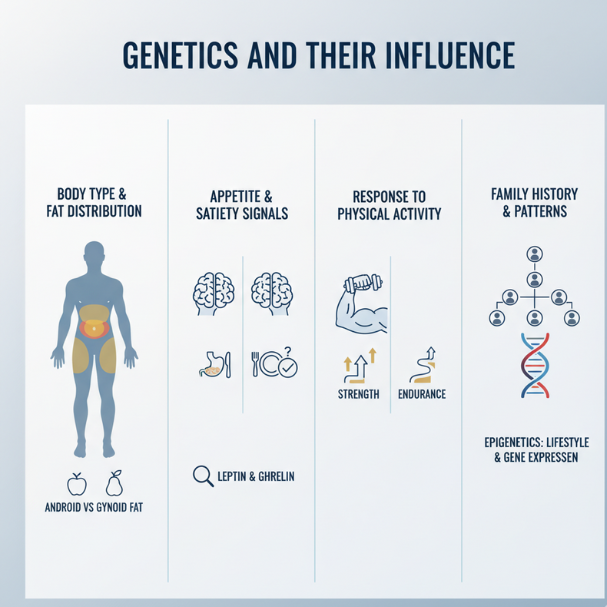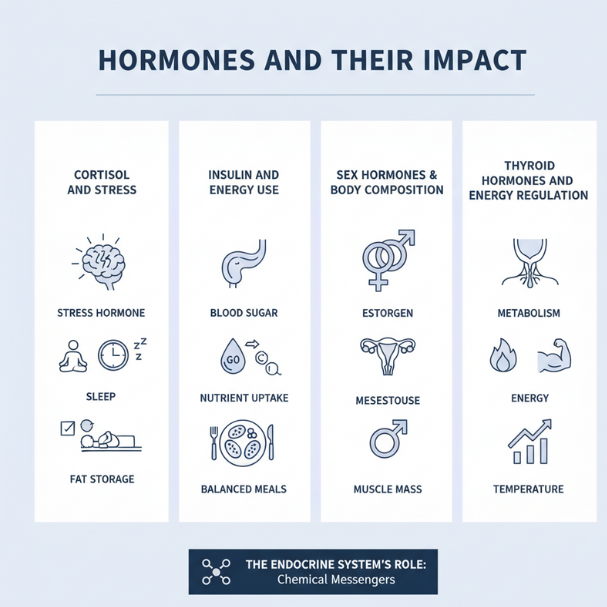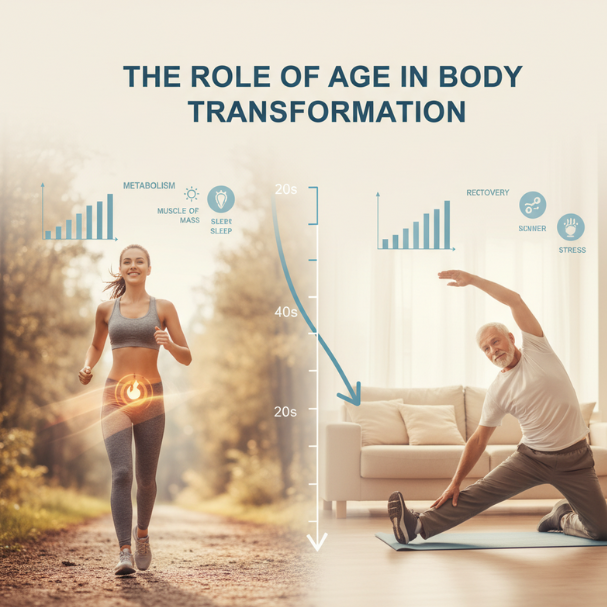When it comes to changing body composition or striving for better health, many people quickly realize that progress is not just about eating less or moving more. The human body is a complex system influenced by multiple factors, and among the most significant ones are age, genetics, and hormones. These elements can determine how easily your body responds to new lifestyle habits, how quickly you notice changes, and even how sustainable those changes are in the long run. Understanding these influences can help set realistic expectations and guide you toward strategies that work best for your unique situation.
The Role of Age in Body Transformation

Metabolism and Calorie Utilization
As we grow older, the way our bodies process energy changes. A younger body often burns calories more efficiently due to a higher basal metabolic rate (BMR). BMR refers to the amount of energy your body needs just to maintain essential functions such as breathing, circulating blood, and regulating temperature. With age, BMR tends to decrease, which means your body naturally burns fewer calories at rest compared to when you were younger. This can make it more challenging to see quick changes, even if your eating and activity patterns remain consistent.
Muscle Mass and Physical Activity
Another major age-related factor is the gradual decline in muscle mass, known as sarcopenia. Since muscle tissue burns more calories than fat tissue, a reduction in muscle mass slows down the overall energy expenditure. This shift often begins in your 30s and accelerates in later decades, especially if strength training or other muscle-preserving activities are not part of your routine. On the positive side, studies show that resistance training and regular physical activity can slow or even reverse age-related muscle loss, making it possible to maintain strength and metabolic efficiency well into later years.
Lifestyle Changes with Age
Age also brings lifestyle transitions that affect overall health. Careers, family responsibilities, or retirement can alter activity levels and daily routines. Sleep patterns may shift, stress levels can fluctuate, and recovery times from exercise often lengthen. All of these factors combined create a different environment for managing body composition compared to earlier stages of life. Recognizing these shifts allows you to make adjustments, such as prioritizing sleep, choosing low-impact exercises, or being more mindful of food choices.
Genetics and Their Influence

Body Type and Fat Distribution
Genetics play a powerful role in shaping how the body stores fat and builds muscle. Some individuals are naturally predisposed to carry more fat in certain areas, such as the hips, thighs, or midsection, while others may store it more evenly. These genetic patterns, often linked to ancestral survival mechanisms, can make it easier or harder to change body shape in noticeable ways. For example, someone with a genetic tendency toward abdominal fat storage may find it more challenging to slim the waistline despite healthy habits.
Appetite and Satiety Signals
Genes also affect appetite regulation. Hormones like leptin and ghrelin, which control hunger and fullness signals, are influenced by genetic variations. Some people may feel satisfied after smaller meals, while others might naturally have a stronger drive to eat larger portions. This does not mean one is doomed to overeat but rather that self-awareness and mindful eating practices can play an even more critical role for individuals whose genetic profile leans toward higher appetite levels.
Response to Physical Activity
Genetics can also determine how effectively your body responds to different types of exercise. Some individuals gain muscle more quickly from resistance training, while others may excel in endurance activities like running or swimming. Understanding where your strengths lie allows you to tailor your fitness plan to maximize results while keeping motivation high. For instance, if your body adapts better to strength training, incorporating more resistance-based workouts may provide noticeable progress compared to relying heavily on cardio alone.
Family History and Patterns
Observing family health patterns can provide clues about genetic influence. If several relatives tend to experience difficulty maintaining a stable body size, that may suggest a shared genetic predisposition. However, it is important to remember that lifestyle still plays a significant role. While genetics may set the stage, daily habits determine how those genes are expressed. Epigenetics—the study of how behavior and environment affect gene expression—shows that positive lifestyle changes can often override genetic predispositions.
Hormones and Their Impact

The Endocrine System’s Role
Hormones act as chemical messengers that regulate nearly every bodily function, from metabolism and appetite to sleep and mood. When these hormones are balanced, the body can more easily maintain energy and composition. When imbalances occur, however, progress may slow down or stall, even with consistent effort.
Cortisol and Stress
Cortisol, often referred to as the stress hormone, has a direct impact on how the body stores energy. Elevated cortisol levels, particularly from chronic stress, can encourage fat storage in the abdominal region. This is why stress management techniques such as meditation, yoga, or even deep-breathing exercises are vital for maintaining progress. Stress not only affects eating habits but also influences sleep quality, which further impacts hormonal balance.
Insulin and Energy Use
Insulin is another critical hormone, responsible for regulating blood sugar levels and enabling cells to absorb glucose for energy. When insulin levels remain stable, energy is used efficiently, and fat storage is minimized. However, poor dietary habits, irregular eating schedules, or insufficient physical activity can interfere with insulin sensitivity, making it harder for the body to use energy properly. This highlights the importance of balanced meals that combine proteins, healthy fats, and complex carbohydrates.
Sex Hormones and Body Composition
Estrogen, progesterone, and testosterone are particularly influential in how the body builds or stores tissue. For women, fluctuations in estrogen and progesterone during menstrual cycles, pregnancy, or menopause can alter metabolism, appetite, and fat distribution. For men, a gradual decline in testosterone levels with age can lead to increased fat storage and reduced muscle mass. While these hormonal changes are natural, lifestyle adjustments like resistance training, balanced nutrition, and stress management can help minimize their impact.
Thyroid Hormones and Energy Regulation
The thyroid gland produces hormones that regulate metabolism and energy usage. When thyroid hormone levels are balanced, the body efficiently converts nutrients into energy. However, even subtle shifts can alter energy levels, mood, and how the body stores fat. While the thyroid is just one piece of the puzzle, it illustrates how sensitive the body can be to hormonal changes.
Interconnectedness of Age, Genetics, and Hormones
Although age, genetics, and hormones each have distinct effects, they rarely act in isolation. For example, genetic predispositions can influence how hormones are produced or how effectively they function. Similarly, aging can alter hormone production, which then affects metabolism and fat distribution. Understanding these interconnections helps create a more realistic and compassionate approach toward body goals. Instead of expecting quick changes, it becomes easier to focus on sustainable progress and self-care.
Practical Strategies to Navigate These Factors

Embrace Strength Training
Since aging naturally reduces muscle mass, incorporating resistance exercises can help preserve and even build new muscle tissue. This not only supports metabolism but also improves overall strength and functional mobility, which are especially important as the body matures.
Prioritize Protein Intake
Genetic factors and hormonal shifts can both impact how efficiently your body repairs and builds muscle. Ensuring adequate protein intake supports recovery, helps maintain lean tissue, and contributes to a balanced appetite by promoting satiety.
Focus on Stress and Sleep Management
Since hormones like cortisol and melatonin are heavily influenced by stress and rest, prioritizing relaxation and high-quality sleep is essential. Developing a consistent bedtime routine, reducing screen time before bed, and incorporating stress-reducing practices into your day can make a significant difference.
Customize Your Approach
Acknowledging genetics means accepting that your journey may look different from someone else’s. Instead of comparing progress, focus on building habits that align with your body’s unique tendencies. Whether that means trying different types of physical activity, adjusting meal timing, or exploring new relaxation methods, personalization often leads to greater success.
Stay Patient and Consistent
Perhaps the most important strategy is patience. Age, genetics, and hormones can slow the visible pace of progress, but they do not prevent progress altogether. Consistency in healthy choices compounds over time, leading to meaningful and lasting changes.
Final Thoughts
Every individual’s journey toward a healthier body is unique, shaped by the complex interplay of age, genetics, and hormones. While these factors may influence the pace and pattern of change, they do not dictate the final outcome. Understanding how they work allows you to set realistic goals, choose strategies that align with your body’s needs, and practice self-compassion along the way. Rather than focusing solely on appearance, paying attention to strength, energy, and overall well-being creates a more holistic and sustainable path. Your body is not working against you; it is simply operating within the framework of its biology. By learning to work with it, you can create meaningful progress that lasts a lifetime. All you need to do to begin this transformative journey with Ciranox is fill out our sign-up form—get your subscription today and take the first step toward a healthier, stronger, and more vibrant you.




